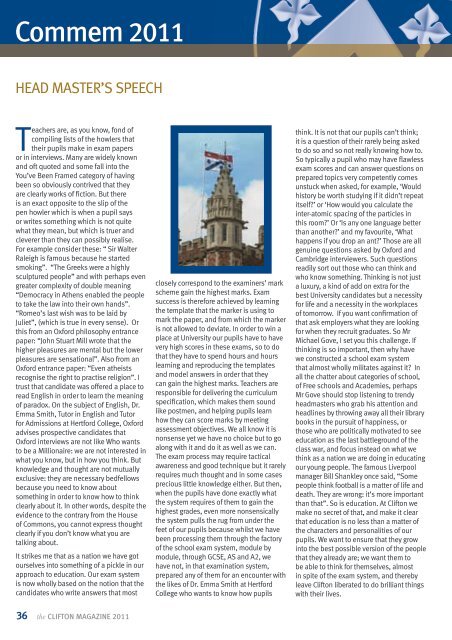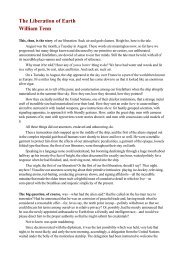Old_Cliftonian_Mag_2011
Old_Cliftonian_Mag_2011
Old_Cliftonian_Mag_2011
Create successful ePaper yourself
Turn your PDF publications into a flip-book with our unique Google optimized e-Paper software.
Commem <strong>2011</strong><br />
HEAD MASTER’S SPEECH<br />
Teachers are, as you know, fond of<br />
compiling lists of the howlers that<br />
their pupils make in exam papers<br />
or in interviews. Many are widely known<br />
and oft quoted and some fall into the<br />
You’ve Been Framed category of having<br />
been so obviously contrived that they<br />
are clearly works of fiction. But there<br />
is an exact opposite to the slip of the<br />
pen howler which is when a pupil says<br />
or writes something which is not quite<br />
what they mean, but which is truer and<br />
cleverer than they can possibly realise.<br />
For example consider these: “ Sir Walter<br />
Raleigh is famous because he started<br />
smoking”. “The Greeks were a highly<br />
sculptured people” and with perhaps even<br />
greater complexity of double meaning<br />
“Democracy in Athens enabled the people<br />
to take the law into their own hands”.<br />
“Romeo’s last wish was to be laid by<br />
Juliet”, (which is true in every sense). Or<br />
this from an Oxford philosophy entrance<br />
paper: “John Stuart Mill wrote that the<br />
higher pleasures are mental but the lower<br />
pleasures are sensational”. Also from an<br />
Oxford entrance paper: “Even atheists<br />
recognise the right to practise religion”. I<br />
trust that candidate was offered a place to<br />
read English in order to learn the meaning<br />
of paradox. On the subject of English, Dr.<br />
Emma Smith, Tutor in English and Tutor<br />
for Admissions at Hertford College, Oxford<br />
advises prospective candidates that<br />
Oxford interviews are not like Who wants<br />
to be a Millionaire: we are not interested in<br />
what you know, but in how you think. But<br />
knowledge and thought are not mutually<br />
exclusive: they are necessary bedfellows<br />
because you need to know about<br />
something in order to know how to think<br />
clearly about it. In other words, despite the<br />
evidence to the contrary from the House<br />
of Commons, you cannot express thought<br />
clearly if you don’t know what you are<br />
talking about.<br />
It strikes me that as a nation we have got<br />
ourselves into something of a pickle in our<br />
approach to education. Our exam system<br />
is now wholly based on the notion that the<br />
candidates who write answers that most<br />
closely correspond to the examiners’ mark<br />
scheme gain the highest marks. Exam<br />
success is therefore achieved by learning<br />
the template that the marker is using to<br />
mark the paper, and from which the marker<br />
is not allowed to deviate. In order to win a<br />
place at University our pupils have to have<br />
very high scores in these exams, so to do<br />
that they have to spend hours and hours<br />
learning and reproducing the templates<br />
and model answers in order that they<br />
can gain the highest marks. Teachers are<br />
responsible for delivering the curriculum<br />
specification, which makes them sound<br />
like postmen, and helping pupils learn<br />
how they can score marks by meeting<br />
assessment objectives. We all know it is<br />
nonsense yet we have no choice but to go<br />
along with it and do it as well as we can.<br />
The exam process may require tactical<br />
awareness and good technique but it rarely<br />
requires much thought and in some cases<br />
precious little knowledge either. But then,<br />
when the pupils have done exactly what<br />
the system requires of them to gain the<br />
highest grades, even more nonsensically<br />
the system pulls the rug from under the<br />
feet of our pupils because whilst we have<br />
been processing them through the factory<br />
of the school exam system, module by<br />
module, through GCSE, AS and A2, we<br />
have not, in that examination system,<br />
prepared any of them for an encounter with<br />
the likes of Dr. Emma Smith at Hertford<br />
College who wants to know how pupils<br />
think. It is not that our pupils can’t think;<br />
it is a question of their rarely being asked<br />
to do so and so not really knowing how to.<br />
So typically a pupil who may have flawless<br />
exam scores and can answer questions on<br />
prepared topics very competently comes<br />
unstuck when asked, for example, ‘Would<br />
history be worth studying if it didn’t repeat<br />
itself?’ or ‘How would you calculate the<br />
inter-atomic spacing of the particles in<br />
this room?’ Or ‘Is any one language better<br />
than another?’ and my favourite, ‘What<br />
happens if you drop an ant?’ Those are all<br />
genuine questions asked by Oxford and<br />
Cambridge interviewers. Such questions<br />
readily sort out those who can think and<br />
who know something. Thinking is not just<br />
a luxury, a kind of add on extra for the<br />
best University candidates but a necessity<br />
for life and a necessity in the workplaces<br />
of tomorrow. If you want confirmation of<br />
that ask employers what they are looking<br />
for when they recruit graduates. So Mr<br />
Michael Gove, I set you this challenge. If<br />
thinking is so important, then why have<br />
we constructed a school exam system<br />
that almost wholly militates against it? In<br />
all the chatter about categories of school,<br />
of Free schools and Academies, perhaps<br />
Mr Gove should stop listening to trendy<br />
headmasters who grab his attention and<br />
headlines by throwing away all their library<br />
books in the pursuit of happiness, or<br />
those who are politically motivated to see<br />
education as the last battleground of the<br />
class war, and focus instead on what we<br />
think as a nation we are doing in educating<br />
our young people. The famous Liverpool<br />
manager Bill Shankley once said, “Some<br />
people think football is a matter of life and<br />
death. They are wrong: it’s more important<br />
than that”. So is education. At Clifton we<br />
make no secret of that, and make it clear<br />
that education is no less than a matter of<br />
the characters and personalities of our<br />
pupils. We want to ensure that they grow<br />
into the best possible version of the people<br />
that they already are; we want them to<br />
be able to think for themselves, almost<br />
in spite of the exam system, and thereby<br />
leave Clifton liberated to do brilliant things<br />
with their lives.<br />
36 the CLIFTON MAGAZINE <strong>2011</strong>



